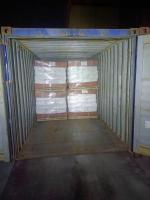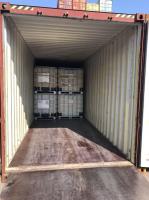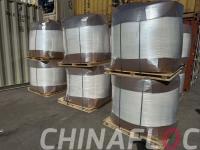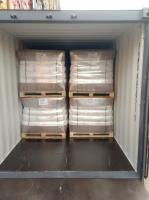Our Products
Polyacrylamide / AMC CR 650 equivalent model of Chinafloc A3018 from chinafloc

AMC CR 650 equivalent model of Chinafloc A3018 from chinafloc
Main Application of AMC CR 650
AMC CR 650 is primarily used as a fluid loss control additive and viscosifier in drilling operations. Its main application involves improving drilling fluid properties to achieve more stable, effective, and efficient well construction. By enhancing the fluid’s ability to form a low-permeability filter cake on the borehole walls, AMC CR 650 helps maintain wellbore stability, reduce drilling fluid invasion into the formation, and protect valuable reservoir zones. Though the ultimate goal of employing AMC CR 650 is fluid loss control, its advantages also encompass better wellbore integrity, improved drilling efficiency, and reduced overall drilling costs.
Contextual Understanding of AMC CR 650
In drilling operations, especially those involving water wells, oil and gas wells, or mineral exploration boreholes, the drilling fluid (often called "mud") serves multiple critical functions. It suspends and transports cuttings to the surface, stabilizes the borehole walls, cools and lubricates the drill bit, and controls subsurface pressures. A well-designed fluid also minimizes damage to productive formations, reduces the risk of unwanted fluid loss, and preserves the structural integrity of the borehole. Achieving these objectives requires the careful selection of drilling fluid additives.
AMC CR 650, developed by a reputable drilling fluid solutions provider, falls into the category of specialized polymers that modify the rheological and filtration characteristics of water-based drilling fluids. Such polymers are widely recognized in the drilling industry. They interact with suspended particles, bridging agents, and the porous nature of subsurface formations to create a protective layer—often termed a "filter cake"—on the borehole wall. By doing so, they regulate the flow of fluid into and out of the formation, ultimately ensuring the drilling operation remains stable, efficient, and safe.
Fluid Loss Control: The Core Function
The fundamental application for AMC CR 650 is to serve as a fluid loss control agent. "Fluid loss" in drilling refers to the unintended seepage of drilling fluid filtrate into the formation. This infiltration can cause numerous problems:
-
Wellbore Instability: When drilling fluid flows uncontrollably into permeable zones, the destabilizing effect can lead to enlargements, cave-ins, or collapses of the borehole. Stabilizing the wellbore is critical for maintaining a proper drilling trajectory, ensuring that casing can be run easily, and preventing costly remedial operations.
-
Formation Damage: Reservoir formations, often consisting of porous rocks saturated with hydrocarbons or groundwater, can be sensitive to fluid invasion. Uncontrolled filtrate loss may change the rock’s permeability or cause clay swelling within the formation, reducing its productivity or groundwater yield.
-
Reduced Drilling Efficiency: Excessive fluid loss can lead to the thickening of filter cake inside the borehole, increasing torque and drag on the drill string. This raises the mechanical effort and potentially escalates energy consumption and drilling time.
By incorporating AMC CR 650, drilling fluids can form a thinner, less permeable filter cake, minimizing fluid seepage. Controlling fluid loss preserves formation integrity and ensures the wellbore remains stable throughout drilling. This benefit is particularly crucial when drilling through sensitive formations or highly permeable zones. The end result is a more controlled and predictable drilling environment, lower non-productive time, and increased confidence in the integrity of the hole.
Mechanisms of Action
AMC CR 650 is typically a high molecular weight polymer designed to interact efficiently with water molecules, suspended solids, and mineral surfaces. Its ionic nature, coupled with its polymeric chain structure, allows it to:
-
Increase Viscosity: By increasing the drilling fluid’s viscosity, AMC CR 650 helps suspend solids more effectively. When rock cuttings are better suspended, they can be circulated out of the well more efficiently. While viscosity enhancement is not the primary application (fluid loss control is), it does contribute to maintaining a cleaner hole and reduced risk of settling particles that could cause stuck pipe or poor hole cleaning.
-
Optimize Filter Cake Formation: The polymer chains of AMC CR 650 help create a dense, robust, and uniformly distributed filter cake. Unlike uncontrolled mud invasion, which would lead to thick, uneven cakes, the use of a controlled fluid loss agent leads to a thinner, more pliable filter cake. A high-quality filter cake reduces fluid invasion, lowers the permeability of the near-wellbore region, and maintains the borehole diameter closer to the bit size.
-
Facilitate Particle Bridging: When drilling through formations with micro-fractures or channels, fluid might escape if the drilling fluid does not contain appropriate bridging materials. AMC CR 650, especially when used in conjunction with bridging particles (such as calcium carbonate, sized salt, or other lost circulation materials), can help create a stable seal over the formation openings. This synergy ensures that even challenging formations are effectively isolated, maintaining borehole integrity and preventing excessive fluid loss.
Application Environments
While AMC CR 650 is versatile and can be utilized in a variety of drilling contexts, it is particularly beneficial in the following scenarios:
-
Water Well Drilling: When drilling for groundwater, it is essential to maintain stable and clean boreholes. Excessive fluid invasion in water wells can contaminate freshwater aquifers or reduce the yield of the target water-bearing formation. AMC CR 650 controls fluid loss, ensuring minimal invasion and preserving the natural characteristics of the aquifer.
-
Mineral Exploration: Exploratory drilling in the mining sector often encounters formations that vary widely in permeability and sensitivity. Using AMC CR 650 helps preserve the integrity of mineral-bearing zones by controlling fluid loss and maintaining sample quality. This leads to more reliable geological data, better core samples, and improved knowledge of the deposit’s characteristics.
-
Oil and Gas Wells: Even though oil and gas drilling typically involves more complex mud systems than a basic water-based fluid, AMC CR 650 or similar fluid loss additives can still find a place in less complicated sections of the well, such as top-hole drilling. Here, controlling fluid loss is vital to prevent the contamination of shallow groundwater, ensure stable upper well sections, and maintain good drilling progress.
Operational Advantages
Incorporating AMC CR 650 into a drilling fluid program delivers several tangible operational advantages:
-
Enhanced Rate of Penetration (ROP): By stabilizing the borehole and reducing non-productive events (such as stuck pipe, lost circulation, or borehole instability), the drilling crew can maintain a more consistent drilling rate, improving the overall efficiency of the operation.
-
Cost Reduction: Lowering fluid loss can reduce the consumption of additional additives and minimize the occurrence of wellbore problems that can lead to expensive remedial measures. Over time, these savings contribute to a more cost-effective well construction program.
-
Improved Hole Cleaning: With proper viscosity and controlled fluid loss, the drilling fluid can clean the hole more effectively. Good hole cleaning reduces the risk of cuttings bed build-up, torque, and drag, all of which can increase drilling difficulty and time.
-
Better Formation Evaluation: When fluid invasion into the formation is minimized, the integrity of wireline logs, formation evaluation tests, and even sampling for petrophysical analysis improves. This leads to more accurate decisions regarding completion, stimulation, or production strategies.
Environmental and Health Considerations
The drilling industry is increasingly concerned with environmental stewardship and the health and safety of personnel. AMC CR 650, like many modern drilling fluid additives, is typically selected to be compatible with health, safety, and environmental (HSE) guidelines. By reducing fluid loss and stabilizing the wellbore, AMC CR 650 helps prevent unwanted fluid migration into sensitive formations, groundwater contamination, and surface spills caused by instability-induced issues. Its effectiveness in a relatively low concentration also means fewer overall chemicals may be required, contributing to more sustainable drilling practices.





